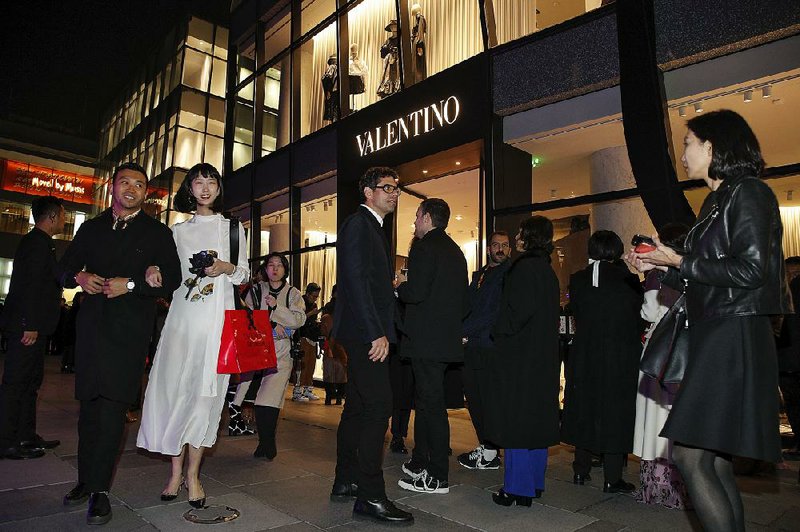The biggest shopping day in China is fast approaching, and U.S. companies are treading carefully.
Nov. 11, known as Singles Day or Double-11, started as an anti-Valentine's Day celebration before the Chinese e-commerce giant Alibaba Group converted it into an annual shopping spectacle that generates billions of dollars in sales. This year, Taylor Swift will help kick off the proceedings by performing at a gala in Shanghai. Some 22,000 international merchants are expected to offer discounts and other deals, mostly online, without the overnight lines and doorbuster bargains associated with Black Friday in the United States.
U.S. companies have seemed unsure of how to approach China's $90 billion ad market, believed to be the second-largest in the world. The trade dispute with the United States has led some Chinese consumers to spurn U.S. brands, and tensions over how companies have addressed pro-democracy demonstrations in Hong Kong have further complicated the economic back-and-forth.
Even before the disquiet, Chinese companies had overtaken many U.S. rivals in spending on ads. In 2015, half the top 10 marketers in China were Western brands, with Procter & Gamble in first place, according to data from Magna, a media intelligence firm. Last year, three remained on the list, led by Coca-Cola in fifth place.
"Western brands have been scaling back their spending," said Luke Stillman, Magna's senior vice president of digital intelligence.
If the trade war weakens China's currency and makes U.S. products less affordable, those brands could cut the amount they spend on marketing further, Brian Wieser, who analyzes media for GroupM, wrote in a blog post in August.
U.S. companies, facing increasing pressure in the United States to take a stand on social issues, have lately stayed away from any whiff of the political in ads that appear in China.
"They definitely talk about being conservative, and they try to double-check things over and over again," said Ker Zheng, a marketing and partnerships manager at Azoya Group, which helps companies enter the Chinese e-commerce market. "Chinese people in general are very averse to talking about politics, and if they do, it's in very hushed tones."
A few days before Singles Day, advertisements on the Alibaba-owned Tmall shopping platform from companies like Dell, Nike and Procter & Gamble were more functional than flashy, focused largely on discounts. The Chinese government let companies and advertising partners know that they were being watched by issuing a notice this month warning against misleading marketing for the shopping event.
Last year, U.S. companies such as Apple, Nike and Adidas generated more than $14 million apiece in Singles Day sales, but for many Chinese shoppers, President Donald Trump's talk on trade has damaged perceptions of U.S. brands, according to research from the New York chapter of the American Marketing Association.
Chinese consumers also reacted with disapproval last month to what they saw as signs of support for the Hong Kong protesters from U.S. businesses including Apple, the National Basketball Association and Tiffany & Co.
In a survey, 78% of Chinese respondents said they would reconsider buying U.S. brands on Singles Day. In another survey of Chinese consumers, more than half said they had avoided U.S. products.
"It's not so much nationalism as it is anti-Americanism," said David Jones, a former chief executive of the ad giant, Havas, and the founder of the branding and technology group, You & Mr. Jones.
On Wednesday night, in the Manhattan offices of a Chinese business school founded with help from the Hong Kong billionaire Li Ka-shing, the New York branch of the American Marketing Association convened a panel discussion on how U.S. companies can reach resistant consumers in China.
"You don't want to be known as an American brand -- you want to be known as a Chinese brand," said Joe Tripodi, a former chief marketing officer at Coca-Cola and Subway. "There will always be aspects of your brand that have dimensions of your origin, but the successful brands, in my experience, have really made a massive effort to become seen as a local brand."
Xi Jinping, China's president, pledged this month that "China will open its doors only wider to the world." But the country's leadership has encouraged consumers to buy local, especially as the Chinese economy slows, panelists said.
"I was born in a time when China lacked everything, when everything imported was good stuff," said Daisy King, an adviser to companies trying to make an impression in China. "In recent years, the Chinese government has been trying to promote nationalism and good-quality local products."
Business on 11/09/2019
